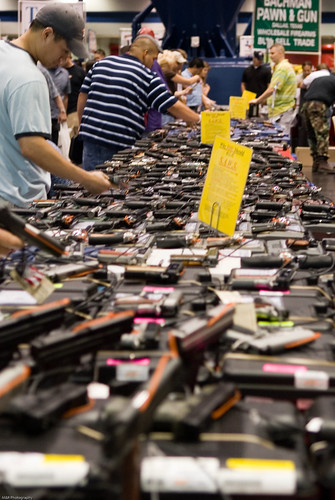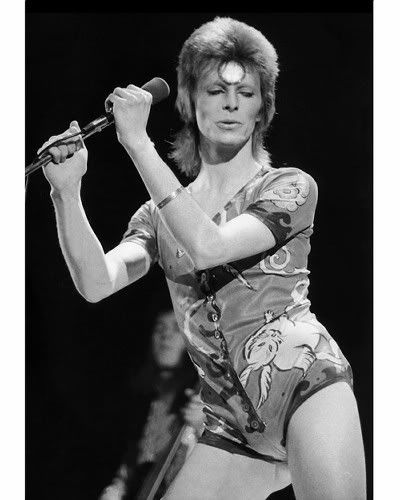
So... Wait. Let me get this straight.
The Second Amendment of our United States Constitution reads as follows:
Now, let's backtrack about 23 words, back to those first four.
A well regulated Militia.
& we'll add the next bit, too, as that comma is clearly olde-timey; the only way the sentence makes grammatical sense is if the whole clause reads thus:
A well regulated Militia being necessary to the security of a free State...
Meaning: "Assuming that a well-regulated Militia is necessary to the security of a free State." Meaning, not only is the right to bear arms predicated on a well-regulated Militia (not three guys in a Dodge Durango)—or even a "Militia" being a system of organization that people are apt to utilize—but the intent of this Militia was that State could protect against State—as in, if Massachusetts decided to take over Connecticut (a choice, by the way, that I would have no problem with), Connecticut should be able to have guns to defend itself.
All right. That said, explain this to me:
An explosion of cases will keep courts busy for years defining gun control's new limits now that the high court has ruled that wherever they live, Americans have a right to possess guns, at least for self-defense in the home. (AP)
Really. Someone. Please. I am at a loss. This just quite literally does not make sense to me. Nowhere—nowhere—in the 27 words of that amendment does it indicate that arms are appropriate for home use. In fact, it indicates quite the opposite: a well regulated Militia—State defense, not self-defense. I feel like the court just redeclared drinking illegal, ruled that the way we count people includes fractions again: it's as if they ignored the first line of the amendment entirely.
Because, being a Fruity Liberal Wuss (or, as I like to put it, Someone Who Prefers That More People Stay Alive Than Not), I read this amendment as self-abolishing; once a well regulated Militia is no longer necessary to keep individual states free, then the government can infringe to its heart's content. Otherwise, why on earth would the framers of the Constitution have phrased it that way, with a conditional/descriptive clause at the start?
Because my point isn't provable beyond a reasonable doubt, I do accept the opinions of those who say the Framers intended every (able-bodied, male) citizen to have ready access to a gun. However, I would still contend that these "arms" were probably kept in a local storehouse somewhere, for use by the Militia—or, even if they weren't, even if everyone walked around brandishing muskets like so much Kleenex, that America in 1776 was a fundamentally, unforeseeably different place from the America we know & love. What I mean is: this law seems, on several levels, so insanely outdated as to boggle the mind.
Ultimately, I feel about the Constitution the same way I feel about the Bible: you implement the core tenets of each—be they Love Thy Neighbor or Checks & Balances—updating or forgetting entirely the rules that attempt to regulate specific behaviors—such as Sodomy or Gun Ownership—based on the understanding, which I don't think is a particularly hard sell, that progress happens. Destinies get Manifested, & it may be necessary for the Law of the Land to adapt. Put it this way: Thomas Jefferson could never in his wildest dreams conceive of anything like the AK-47, let alone buying one on the internet.
Unlike other socially incorrect laws (read: those involving slavery), this one has remained unchanged, never successfully challenged, because it's essentially impossible to make a clear case for its outdated status (that doesn't employ hyperbolic examples of former presidents & assault rifles) while "arms" are still around. Guns exist; the law talks about guns; ergo, the law ought to exist. But, really, let's take a look at what we've done:
Alito essentially repeated the formulation used by Justice Antonin Scalia two years ago that the court was not calling into question "long-standing prohibitions on the possession of firearms by felons or the mentally ill, or laws forbidding the carrying of firearms in sensitive places such as schools and government buildings."
This is seen as worthy self-congratulation: that we don't bring guns into schools or sell them to the mentally ill. That's considered restraint. That's appropriate regulation. I mean, I just— ...—
These are weapons.
They take lives.
They negate others' existence—void all on which we predicate anything, ever.
I don't care if the person in your sights is Bad or Intimidating or Trying to Steal Your Flatscreen TV: they deserve to be imprisoned, not shot. Even if you disagree with that as a general statement, I would hope you still see the importance of letting the state & its judicial system—or, at the very least, trained police officers—be the ones to make the fatal call.
Am I wrong? I mean, I understand that the game changes once there's a Violent Intruder in your very own home, but I also just don't see the practicality of personal gun ownership in this scenario. For example, assuming you’ve gotten the gun to Protect Your Family, the precautions necessary to truly ensure your child doesn’t blow his or her head off all but nullify any chance of its ready availability in an emergency. Of course, the only response to this foreseeable snag is to be less & less safe—to leave off those child locks, to carry a concealed weapon in public—which will only cause far more hassle, more violence, more death than this could ever be worth. Because honestly, I think what gun owner hopefuls are after is not actual Protection, but the illusion of protection, of security—&, honestly, the illusion of their own Heroism.
I find it frustratingly coincidental (curse you, O Great Screenwriter) that I just spent the other night thinking/writing about Vigilantism: it strikes me that those who would take advantage of this country’s ever-dwindling gun regulation probably think something along the lines of, “Well, I’ll get this gun, just in case; I won’t intend to use it much, but the second someone threatens me or my loved ones, I will spring into action!!! Ka-pow! Ker-chop! Shazaaam!!!!!!” Everyone wants to be the Hero, rightly lauded above all, responsible for having protected Life—paradoxically, of course, in this case, by dealing Death.
& consider this: were I awoken in the middle of the night by suspicious noises, I would absolutely take my (legally purchased) handgun out of my night stand, creep downstairs, & in my panic, probably end up shooting some local teenagers kicking a beer can around my front yard. My point is: 1) people who don’t function well under pressure shouldn’t have the power to kill on sight, 2) that the government can’t (either actually or practically) test for things like competence under pressure, & that therefore, 3) sanctioning guns in every American home—for this & reason upon reason—is effectively sanctioning hundreds of thousands of Accidents Waiting to Happen, & fatal ones at that.
If you feel you need more convincing—that you have a personal tale of gun success to trump my ham-handed examples, that you just like guns & don’t see the big deal—take a gander at the list of gun regulations that could be overturned under the new ruling. One that especially worries me is the misdemeanor domestic violence caveat: that most convicted of domestic violence are technically not serious enough felons to prevent them from now buying a gun, which means that children & spouses of abusive partners have a whole other level of Fear coming their way.
But really, though: let’s please return to the heart of this matter—what stops me from even really engaging in this debate, leaves my brain somewhere behind, bashing again & again against this impossibility like a wind-up toy into a wall: this decision is just not supported by the Constitution of the United States of America at it is written.
I don’t understand—I really just can’t, on many levels—but I can feel that something is rotten in our state, & it’s becoming increasingly clear that Heaven won’t direct it: what we need is a goddamn Well Regulated Militia.
Today's Headphone Fodder:
Rock 'n' Roll Never Looked So Beautiful—Semi Precious Weapons
(Live, Bowery Ballroom, 4/26/10).
To: spw@semipreciousweapons.com 4/27/10, 12:11 AM
Subject: Beautifully fucking done.
Let me start out by saying I have never written a fan letter. (I think they're sometimes silly.) However, let me also say, I have never seen a show as brain-bending, gut-wrenching, simply-fucking-transcendent from beginning to end as tonight at the Bowery Ballroom.
You encompass everything I love about music (megawatts of Raw Power coupled with glitter-glamourous stage aesthetic), & though I haven't been there from the very beginning, I've been with you a good long while, & it's so, so, so excellent to see you positively zooming upwards. Today our love, tomorrow the world—& so it goes.
You are glorious, & you are the future. You are shiny, make-up-spattered titans of rock-&-mother-fucking-roll. I salute you with all the love in my heart.
xxx,
Anneliese
You Love You: The Album. Now available on iTunes.
Do it. You will not be sorry.









